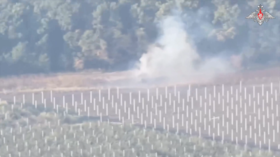Kiev’s “foray” into Russia sought to prevent a swift end to the wider conflict, Aleksandr Bortnikov has said
Ukraine’s incursion into Russia’s Kursk Region was intended to bait Moscow into an asymmetric, hard-line response, the head of the Federal Security Service (FSB) has said.
Speaking at a meeting of top security officials on Friday, Aleksandr Bortnikov said Kiev’s cross-border attack in early August “once again demonstrated the criminal nature of [Vladimir] Zelensky’s regime.”
The FSB director added that the “foray” was “aimed at provoking Russia into a disproportionately harsh response and eliminating the preconditions for resolving the conflict in the foreseeable future.” However, the incursion failed to relieve pressure on Ukrainian defenses in Donbass, where Moscow’s forces have made steady progress in recent months, he said.
According to Bortnikov, Ukrainian operations along the entire frontline are being supported by NATO officers, who are helping Kiev with planning, which in turn “exposes the West’s intention to expand and increase the intensity of hostilities.”
As Ukrainian forces struggle to make progress, NATO countries are “pushing Kiev to more actively conduct a sabotage and terrorist war in Russian border areas,” including raids on nuclear energy and oil facilities and attacks aimed at intimidating civilians, the FSB chief claimed.
After Ukrainian troops attacked Kursk Region, they made initial progress, but their advance was later contained, according to the Russian Defense Ministry, which later said its personnel were pushing back Kiev’s forces. Moscow has estimated Ukraine’s losses in the area at more than 19,800 soldiers since the start of the incursion.
Ukrainian officials have stated that the main goals of the attack were to sway public opinion in Russia and gain a better position for possible peace talks with Moscow. Russian President Vladimir Putin has said that while Moscow has never ruled out engagement, it will only agree to talks after all Ukrainian forces have left Russian soil.



